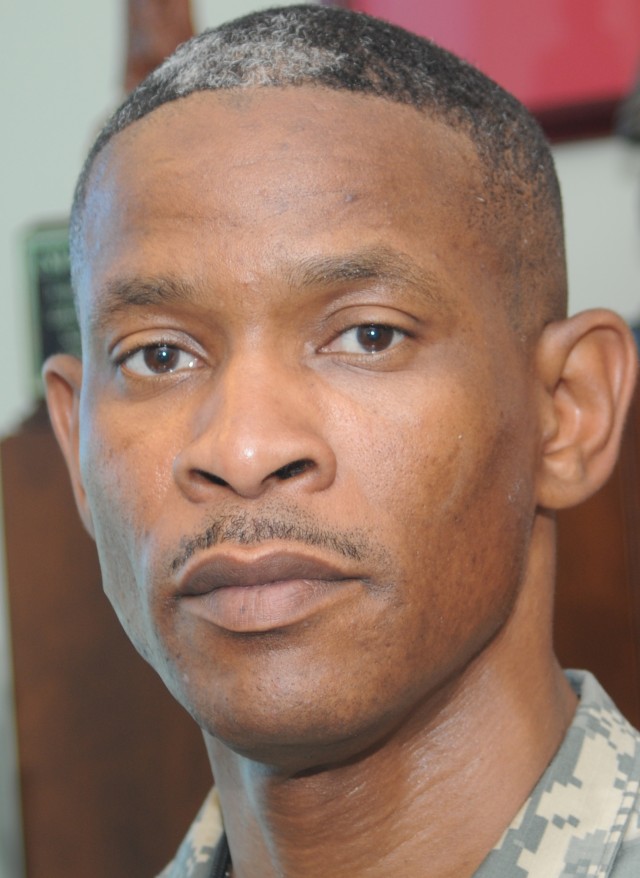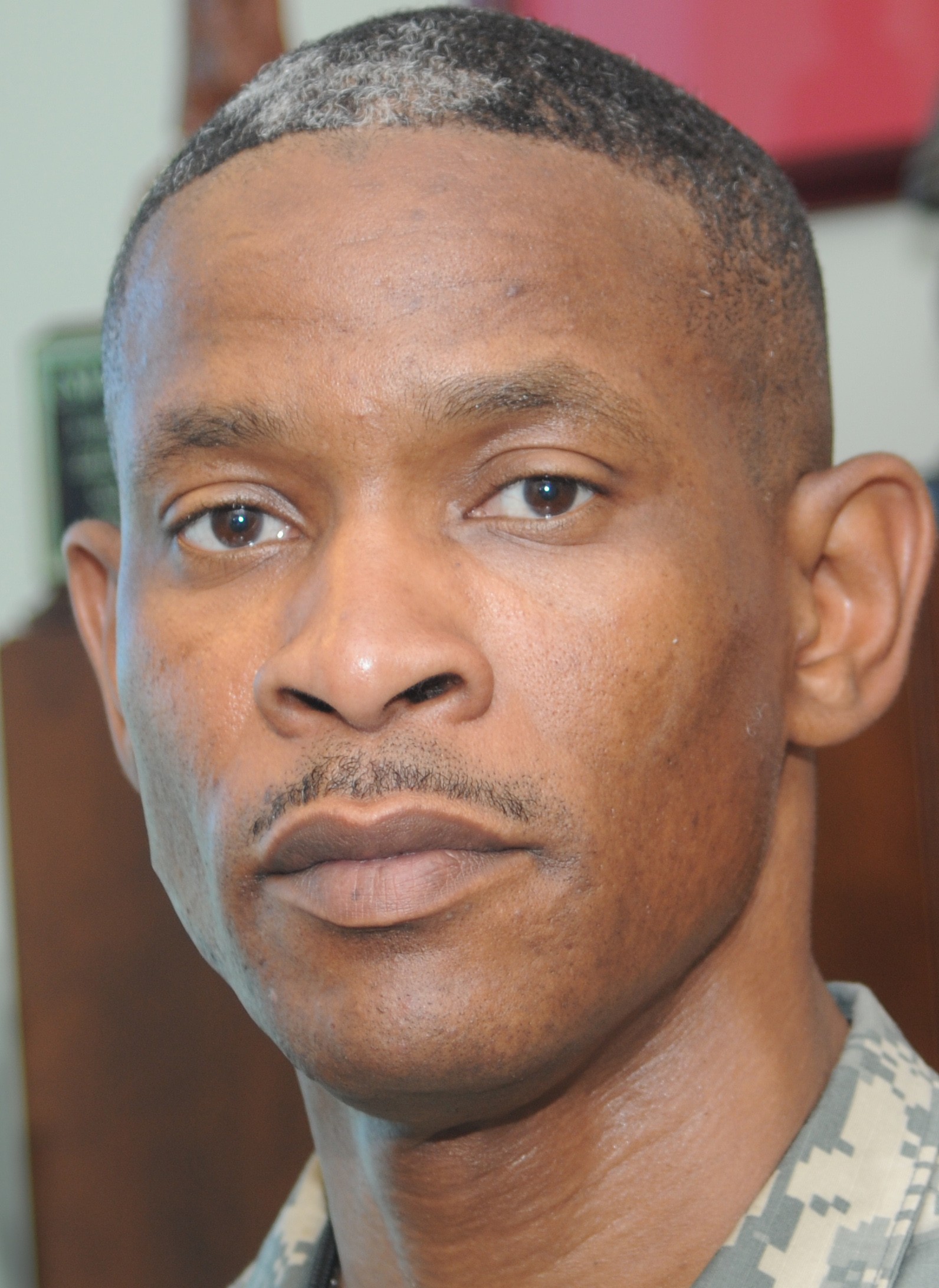FORT LEE, Va. (May 6, 2010) -- As a leader of 107,000 Soldiers, he carries a somewhat intense expression ... a look that says "Try it if you dare."
He also exudes an old-school vibe that conveys the messages "You'll be held accountable" and "I've got work to do."
Some consider him mean or angry, he admitted. At the end of the day, however, the 10th Ordnance Corps regimental command sergeant major, Command Sgt. Maj. Sultan Muhammad, is a Soldier; a compassionate, patriotic, confident and down-to-the root warrior with an appetite for shaking things up for the better.
"I always wanted to be the guy who was responsible for making change," said the 43-year-old, 26-year Soldier who assumed his current duties in March. "I've been assigned to organizations that had poor performance coming up through the ranks, and I've said 'I could change that if I became the leader, if I could become the person in charge."
Muhammad is now in the position to affect change. He is partly responsible for the health and welfare of the second largest corps in the Army and the commander's right hand man for operational issues. But the Baltimore native isn't ready to shake things up - not just yet. He said he is more focused on smoothing the transition related to the school's consolidation at Fort Lee as a result of the Base Realignment and Closure mandate.
"I, along with the chief of ordnance, have to convey to folks that 'It's not as bad as you think it is,'" said Muhammad in reference to the moves that will bring to Fort Lee military members and Families from several ordnance schoolhouses from around the country. "In the long run we're gaining more than we're losing."
The Ordnance Corps transition to Fort Lee largely entails the relocation of the Ordnance Mechanical Maintenance School from Aberdeen Proving Ground, Md., and the Ordnance Electronics Maintenance School from Redstone Arsenal, Ala. The two organizations are as different in culture as a wrench and a multi-meter, and it's fallen on Muhammad to close the divide.
"Most folks think that losing the identity of being at Aberdeen Proving Ground or Redstone Arsenal deteriorates our ability to be the best Corps in the U.S. Army," he said. "I told them that it doesn't. People bring identity to our Corps, and if you keep the people and the team together, then the organization can strive and remain alive and well."
Moving the divide closer to the center is a tough challenge, but then again, Muhammad has the kind of roots that could make a mockery of overcoming and adapting. He is a son of Charm City, also known as Baltimore, Md., but grew up in an area without much charm.
"My upbringing consisted of hard work, hard days, the streets of (West) Baltimore, exposure to a society where you barely got out of high school," said Muhammad. "When I finished high school, there were only 75 people out of 300 that actually graduated."
Muhammad's family life was a counterbalance to his neighborhood's toxic environment. His parents, Yahya Bilal Aziz and Azizah Muhammad, raised eight children under the protective shelter of orthodox Islam. In retrospect, he credits his upbringing with sustaining him through all the negativity Charm City could throw his way.
"As I visit my home, I knew I could've been somebody else," he said.
A somebody far from the former Muhammad. A number of experiences were factors in his personal evolution. At the age 21, with only four years in the Army under his belt, he lost his wife to an illness. He was left to care for a toddler, Sultan II, but overcame his loss shortly thereafter and remarried.
He's also had to overcome doubts about who he is as a person. As a practicing Muslim Soldier, he's had to fight battles over the availability of post facilities in which to worship. He shunned personalizing it and took it up as an issue of fairness.
And he has withstood the skepticism directed toward him - from Muslims and nonbelievers - when the country entered its fight against terrorism. He remembered a 1989 incident in which he was selected as a member of advance party that would deploy to Saudi Arabia just before the first Gulf war. During one of the briefings, another Soldier questioned his loyalty to the United States in front of his commander.
"Before I could address the comment, my commander shut (the Soldier) off (from speaking) and told him, 'Listen, this is the best noncommissioned officer we have in this organization. That's why he's the number one guy to go downrange for us.'
"It made me feel good that, at the same time I was being challenged, I was being honored for my performance," he said.
Don't get Muhammad started on the subject of performance. He knows the institution that is the Army is not a perfect one, but he's recognized that performance is an equalizer - a quality so powerful that it could crush uncertainty.
"Performance outweighs everything," he said. "I tell folks that all the time. It outweighs race, gender, size; it outweighs a lot of things. It you are an outstanding performer, people will not question your allegiance or honor to the mission."
Muhammad has always chased performance, or should it be said a higher purpose of ability. Brig. Gen. Lynn A. Collyar, the chief of ordnance and commanding general, Ordnance School, recognized this quality and more in Muhammad 12 years ago.
"He served as a first sergeant in my battalion when I was a battalion commander," he said. "I've seen him work, I've seen him play, I know him as a Family man and he's a motivator, a great guy to be around; he has the balanced perspective that we need Soldiers to have today."
Muhammad wants that balanced perspective to show; he wants his experience to show; he wants to be a walking, talking Ordnance Corps promotional package.
"I believe that you get nothing out of an organization that you don't believe in," he said. "That has the effect of growing dislike to the Corps. Being the senior guy, I need to show you that I believe in the organization, that I'm proud of who I am, proud of where I was raised, proud of the things I went through, proud of how I got here. The Soldiers and Civilians of this organization don't work for me. I work for them."
That mentality will certainly be of help to the hundreds of Soldiers, Family members and Civilians relocating to Fort Lee as a part of the ordnance Family. They will have to deal with not only moving but also a vastly different organization than the one they were familiar. A strong sense of organization and leadership, said Muhammad, will go a long way in alleviating those anxieties. He'll have at his disposal a new $700 million campus, but the issues Muhammad will have to deal with goes beyond dollars. For those reasons, he'll have to be the responsive, compassionate, patriotic, down-to-the-root warrior that got him here in the first place.
And if he has to, he can always shake things up.


Social Sharing